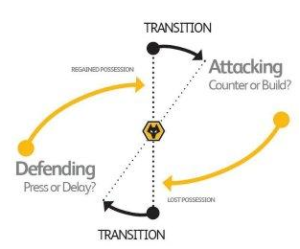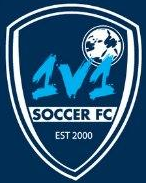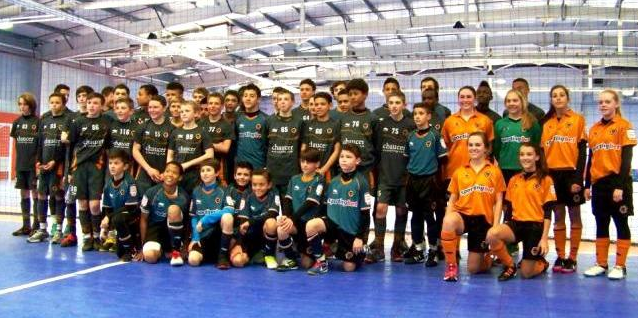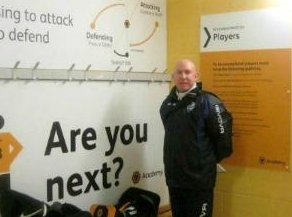1v1 Soccer FC Players Train at Wolves FC Youth Academy in England
Players from North America experience Wolves FC Academy life for one week
Last year Wolves FC Academy, as part of their new Wolves North American Academy initiative, hosted seven player ID camps throughout North America. The best players from each camp were identified and invited to travel to the Wolves FC academy in England to train from March 24-March 31.
The Wolves North American Academy partnership program has been established to develop development programs in North America that can share Wolves FC coaching methodology and provides opportunities for young soccer players in Canada and the U.S. to fully realize their potential.
This is achieved by following the “Wolves Way” player development model and helping to provide the players at partner clubs such as 1v1 Soccer FC with training experiences similar to the young players in England. This training includes technical, tactical, coordination, speed and physiological training preparation. A focus is placed on helping to evaluate the coaching standards at partner clubs by providing on-going coaching support.

The training week in March provided a unique opportunity to twenty-seven young players from Canada and the U.S. to attend and train at one of England’s top rated EPL academies. Nine of the players that attended were identified at the ID camp hosted by 1v1 Soccer FC in Canada last year.
Wolves FC have successfully attained the highest level of Academy status in the UK (Category 1) and share this distinction with only 19 other professional clubs in England. Their Academy has successfully developed world-class players such as Robbie Keane (transferred for total fees of $150 million) and current Manchester City and England international Joleon Lescott.
The players were provided with a busy and challenging schedule for their seven days in England. Heavy snow in England on the group’s arrival led to some changes in the schedule and resulted in the North America players mixing in to play with Wolves FC academy players in several of the sessions. This provided the young North American players with a great insight into the training demands placed on the academy players in England.
Technically, there were some impressive performances from the North American players. It was the tempo of the play that provided the greatest challenge. The play in England is at a very high tempo and players must learn to make quick decisions and play one- or two-touch in the majority of their play. Pressure is placed on players with the ball very quickly and physical challenges are stronger than young players typically face in North America.

Transition is another area where the young English players are prepared very well. Much of the work that they perform in small-sided games places high demands on them to quickly open up and provide passing options to teammates when in possession. When the ball is lost, there is an expectation that pressure will be placed on the opposition quickly and that there will be support in behind to outnumber attackers.
Wolves have formulated a club playing philosophy that their academy teams follow to develop these principles of play. The club aims to develop players to be both knowledgeable and flexible in their application of four key moments of the game. These four key elements are:
1. When players are in possession of the ball
2. When players don’t have possession of the ball
3. When players have won the ball back and are organizing to attack
4. When players have lost possession of the ball and are organizing to defend
At the Wolves FC academy, players must be challenged to become independent decision makers with the ability to understand and carry out the instructions of the coach and react to the needs of the team at any given moment. What is less flexible is the manner in which the football philosophy is applied. Core values of hard work, honesty, togetherness and striving to be the best must be demonstrated at all times.

In addition to a full training schedule, the players and their families were able to watch several of the older academy groups train. They were impressed by the speed of the play, the constant communication by the Wolves academy players and how quickly the ball was transferred around the field.
So what are the expectations placed on the young academy players at Wolves FC?
To be a successful player at Wolves FC, players are required to have the following qualities:
- Take responsibility for your own attitude at all times. Ensure you set high standards both on and off the field of play.
- Ability to handle the ball under pressure to prepare to play at the very highest level. A high level of proficiency will be required in this area.
- Ability to learn. The Academy represents a school of football; on this basis, you must be able to take on board information and apply it in training and in games.
- Players must have their own vision of the game. The very best players see “pictures” before anybody else. You will have to display a certain level of game intelligence.
- Whether you are attacking or defending, winning or losing, playing well or poorly, regardless of opposition or playing surface, in wind, rain, sleet or snow, you must have a desire to play the game
The North American players and their families were very impressed with the facilities at the Wolves FC academy, the quality of the coaching and the level of care provided to the players. The Wolves academy is operated out of one facility, which means that the first team and academy players use the same facility on a daily basis. This provides the young academy players with direct access to professional players as role models. It also creates a very distinctive and consistent training and development culture at the club based on their philosophy. The training environment is all supported by comprehensive education, sports science and performance analysis resources so that players achieve optimal performance and achieve a balanced lifestyle.

Like other professional club academies in Europe, the development of individual players takes priority over teams winning games. Players who are deemed capable are played up in older age-groups, if it makes sense for their continued development. The success of the academy is ultimately judged on the number of players that are elevated to 1st team play. Currently, 25 percent of their young players within the Wolves U18 and U21 academy teams have received 1st team opportunities and the goal is to increase this to 40 percent in the near future.
Wolves are not trying to build teams that win a tournaments or regional leagues but are solely focused on developing players who can realize their potential and hopefully go on the play the game at the professional level. It is fully acknowledged that a player’s development is a long-term process and that patience and persistence are required to achieve optimal results.
To achieve success at the academy levels, Wolves FC, like the other Category 1 clubs such as Manchester City, Arsenal, Chelsea and Manchester United seek to implement the following characteristics within their Elite and Multi-Disciplinary Training Environment:
- An elite environment where players have the necessary time and space to develop
- An environment where all aspects of the program are challenging, developmental (not based on winning until later ages 16+) and inspirational
- The program is supported by outstanding coaches at every phase of the performance pathway
- The coaching program is supported by education, sports science and medicine and a playing games opportunities (30 max/year)
- A multi-disciplinary approach that successfully develops all four aspects of talent development: Technical/Tactical, Physical, Psychological and Social
- The development of educationally rounded graduates who are independent thinkers, both on and off the field.
- An environment that consistently produces professional players at the appropriate levels of the game for each club’s academy status, for Wolves FC this means players that are equipped to be successful at the English Premiership level

The parents that made the trip were impressed by the focus on individual player’s development and an environment where training excellence was stressed over short-term results at the youth levels. High standards were set during the training sessions but the coaching staff were positive in their feedback and worked alongside the players to solve problems on the field. For many, this was their first trip to a professional club overseas and they were very appreciative that their children were provided with an opportunity to train and play at this level.
After the week of training, all players will receive a written evaluation on his/her performances during the week and suggestions on how to continue their development once they return to North America. During the coming months there will be another series of North American ID camps at partner clubs. The ID camp hosted by 1v1 Soccer FC will be July 5-7 in Burlington, Ontario. The players that are successfully identified at this camp will then attend a 3 day residential “national” camp in Rome, Georgia, in order to qualify for selection to attend next year’s Elite Academy Experience week at Wolves.

Players and families interested in trying out for the Wolves National Camp can attend any of the International Academy Identification Camps being held in Canada and the United States during the next few months. For more information, visit the Wolves North American Academy website at www.wolvesnorthamericanacademy.com. For more details on playing the 1v1 Way, visit the club’s website at www.1v1soccerfc.com.
The Wolves North American Academy identification camps are managed by Global Image Sports (GIS), a sports management company that provides opportunities and experiences in partnership with such clubs as West Ham United, UC Sampdoria and Chievo Verona. In addition to camps such as those for Wolves FC Academy, GIS also organizes tours for youth teams and assists clubs with direct access to coaching education and player opportunities with partner clubs. For more information on what GIS can provide to youth soccer clubs, email Mike Kelleher at mike@globalimagesports.com.

Ian McClurg is Founder and Director of Coaching at 1v1 Soccer FC
All photo credit: Ian McClurg






